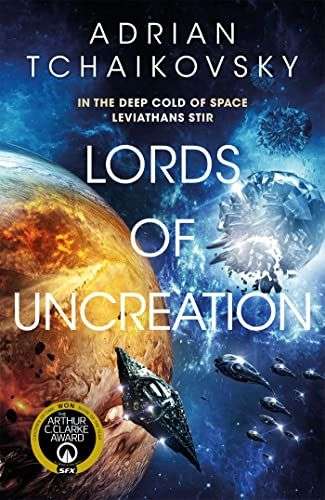Lords of Uncreation by Adrian Tchaikovsky from Tor #BookReview #SciFi #TheFinalArchitecture
Lords of Uncreation by Adrian Tchaikovsky
Tor, hardback, £16.69
Reviewed by Sarah Deeming

Idris Telemmier, Intermediate, has uncovered the Architect’s great secret – they are puppets doing the bidding of masters far stronger than the planet-destroying Architects. If the Architects don’t do as their masters tell them, then they are punished. Leaping on this revelation, the Cartel, which normally operates in the shadows, seize control of human and inhuman efforts to create a weapon that will destroy the Architects once and for all.
But Idris sees things differently. He understands that unless the Masters are dealt with, the war will continue unnecessarily, with massive casualties on both sides while the Masters remain untouched. However, as the allied factions of humans and other living beings break apart, with different sides fighting for the weapon, Idris’s cries for reason go unheard. Idris must fight on his own, but then he always has been alone. This explosive end to The Final Architecture trilogy brings the Masters of unspace against an annoyance of a man who never wanted to be a hero in the first place.
If you’re reading this review, then I’m guessing you’ve already read the first two books and want to know if the ending is as powerful as the rest of the series. The good news is – yes. We finally meet the Masters, the force behind the Architects, and catch a glimpse of their motivations and feelings towards humanity. They are worth the wait, a force so powerful that humanity faces annihilation without support from other races.
All the world-building and character arcs in the previous books come to fruition in Lords of Uncreation. This means there is plenty of action as Tchaikovsky trusts his reader to remember the different factions and their self-interests, and so doesn’t waste page space by needless repeating things. My favourite action sequence is in the middle, with a coup against the Cartel by the Partheni and the Voyenni, which involves space battles and hand-to-hand combats in the ships and scattering the main characters. It was a clever piece of writing, with all the sections falling neatly into place for the reader while leaving the characters at their most exposed.
For me, the real masterpiece of the story was keeping the characters true to form throughout. There were no sudden bouts of heroism or treachery; their actions are consistent, complex and rational, meaning there is no neat ending, but who wants that anyway? I won’t deny that I expected some of the characters’ ends, such as Idris’s and Olli’s, but that’s because there was no other realistic outcome for them. It made reading a tense, nerve-shredding affair as I came to the end of one of the best series I have ever read.
Looking at The Final Architecture series as a whole entity, it is one of those rare things where everything works together. For me, there was no off-pacing or saggy middle or deus ex machina coming in to save the day. And the overall message that it took everyone; human, Hiver, Essiel, Partheni, Hannilambra and Naeromathi, to defeat the Masters is a powerful one, especially in the world we are in today where we must pull together as humans rather than the countries of our birth to battle climate change and war from other people.
Lords of Uncreation is an explosive ending, full of deceit and comradery, rebellion and bloodshed. It is the ending the series deserved, and I am honoured I had an advanced copy for review.

